Months of Meryl: The Post (2017)
 Thursday, December 27, 2018 at 8:41PM
Thursday, December 27, 2018 at 8:41PM John and Matthew are watching every single live-action film starring Meryl Streep.
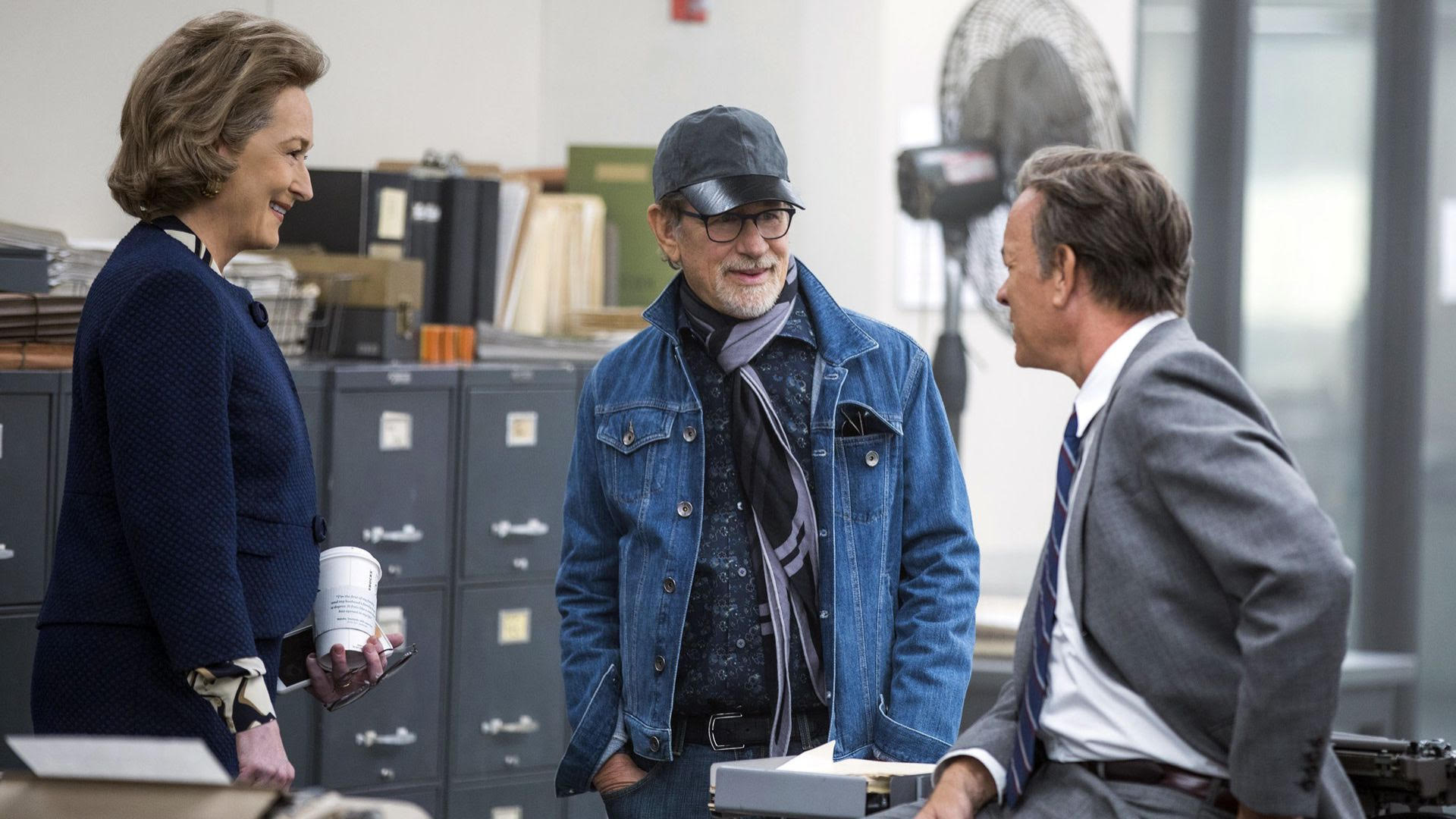
#52 — Katharine “Kay” Graham, pioneering Washington Post publisher who authorized the printing of the Pentagon Papers.
JOHN: Since it was first announced in March of 2017, deep into the first hundred days of the Trump presidency, The Post moved at a breakneck speed from rewriting to shooting to post-production before it quickly arrived in theaters in December of that year. Spielberg had paused production on his historical drama The Kidnapping of Edgardo Mortara and after reading a spec script by Liz Hannah, set the gears into motion on The Post, assembling his usual team (cinematographer Janusz Kaminski, composer John Williams, editor Michael Kahn, among others), along with two screen legends who had never before shared a single frame. This urgent sense of timeliness is palpable in The Post, which is both a riveting period piece about a landmark historical moment and a rousing paean to the free press in our distressing present...
Spielberg’s film chronicles the crucial deliberations in the publication of The Pentagon Papers, the classified, comprehensive Department of Defense study that unearthed the government’s continued lies about its willingly disastrous military campaign in Vietnam. When the Nixon administration sought to challenge the New York Times, which was first to publish stories from the report, the Washington Post, led by publisher Katharine “Kay” Graham and editor-in-chief Ben Bradlee (played in The Post by Tom Hanks), ran portions of the Papers in direct opposition to Nixon and his attorney general. The Supreme Court upheld the Post’s right to publish, ruling that, “In the First Amendment, the Founding Fathers gave the free press the protection it must have to fulfill its essential role in our democracy. The press was to serve the governed, not the governors.”
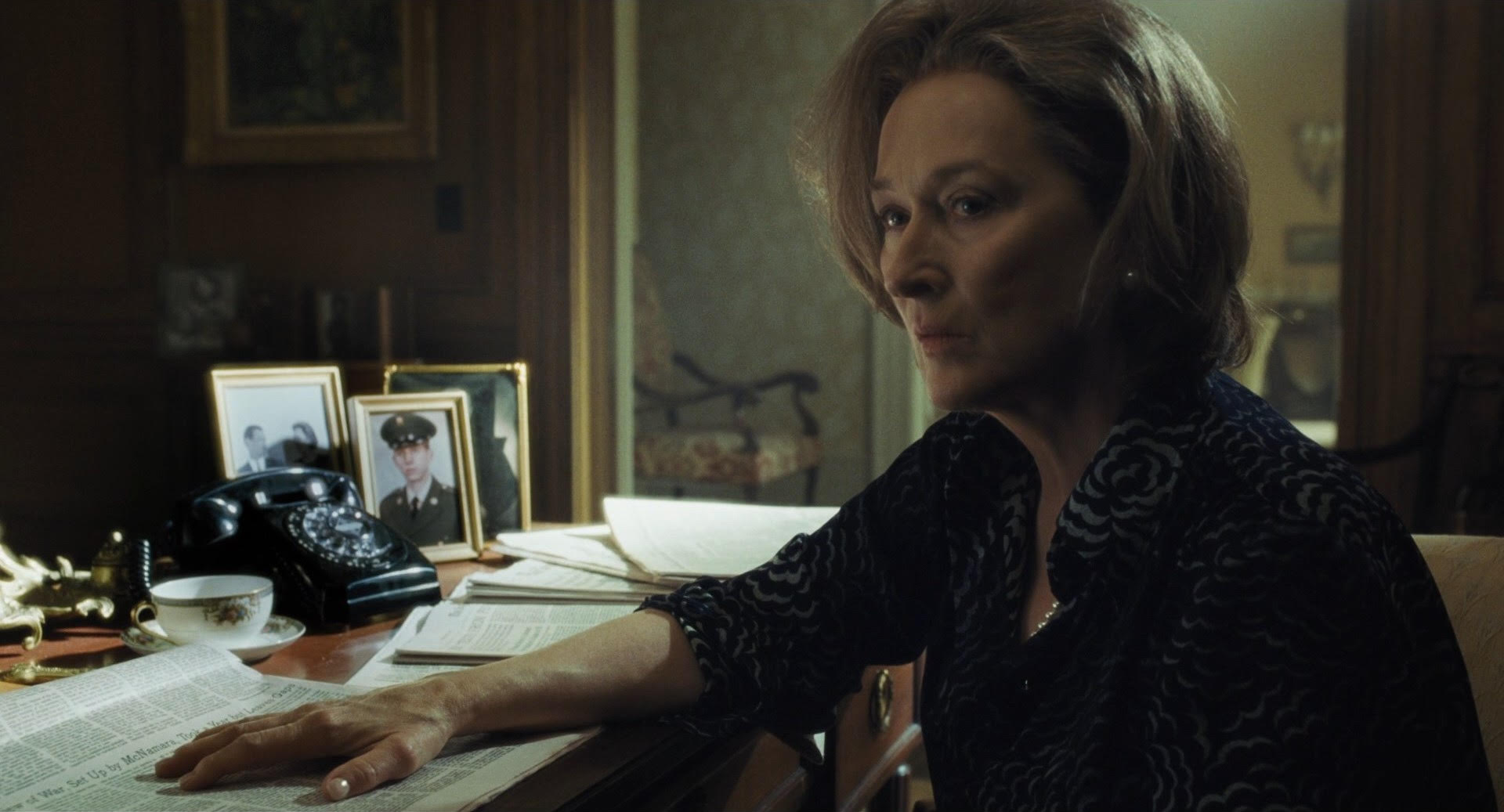
Spielberg and screenwriters Liz Hannah and Josh Singer locate the film’s dramatic tension in Kay Graham, a former socialite and homemaker who became publisher of the Washington Post in 1959 after the suicide of her husband, Philip, the paper’s previous publisher. In order to bolster its prestige and keep it financially afloat, Graham took the paper public on the stock exchange, a delicate process wherein contracts stipulate that should the Post suffer any calamitous events, like, say, its publisher and editor going to jail for contempt of court after openly defying a court order to not publish sensitive government material, shareholders can cancel their deals. Complicating matters further was Graham’s personal relationship with Robert McNamara, a longtime friend whose reputation became mired in controversy after the publication of the Pentagon Papers, a study he commissioned yet whose truth he continually obscured from the public.
Streep, in teaming with Spielberg and acting opposite Hanks, not only finds herself in one of the most fortuitous projects of her career, but also inherits a complex dramatic role in a timely film. As Kay, Streep must constantly perform an assured sense of authority in an environment and position held chiefly by men. Though feminism had been gaining public awareness, people find it hard to take Kay seriously as the publisher of a major newspaper; Streep makes clear that the character is extremely capable, but also dedicated to the paper and upholding the legacy her family has built over the years. Balancing her all-consuming, tireless efforts at the Post with the numerous parties and dinners she gives as a leading D.C. socialite, Kay walks the line between being accommodating and commanding, taking charge at the office and entertaining at home, showing resolve in private conversations but, as the only woman in the room, often cowed into silence at board meetings.
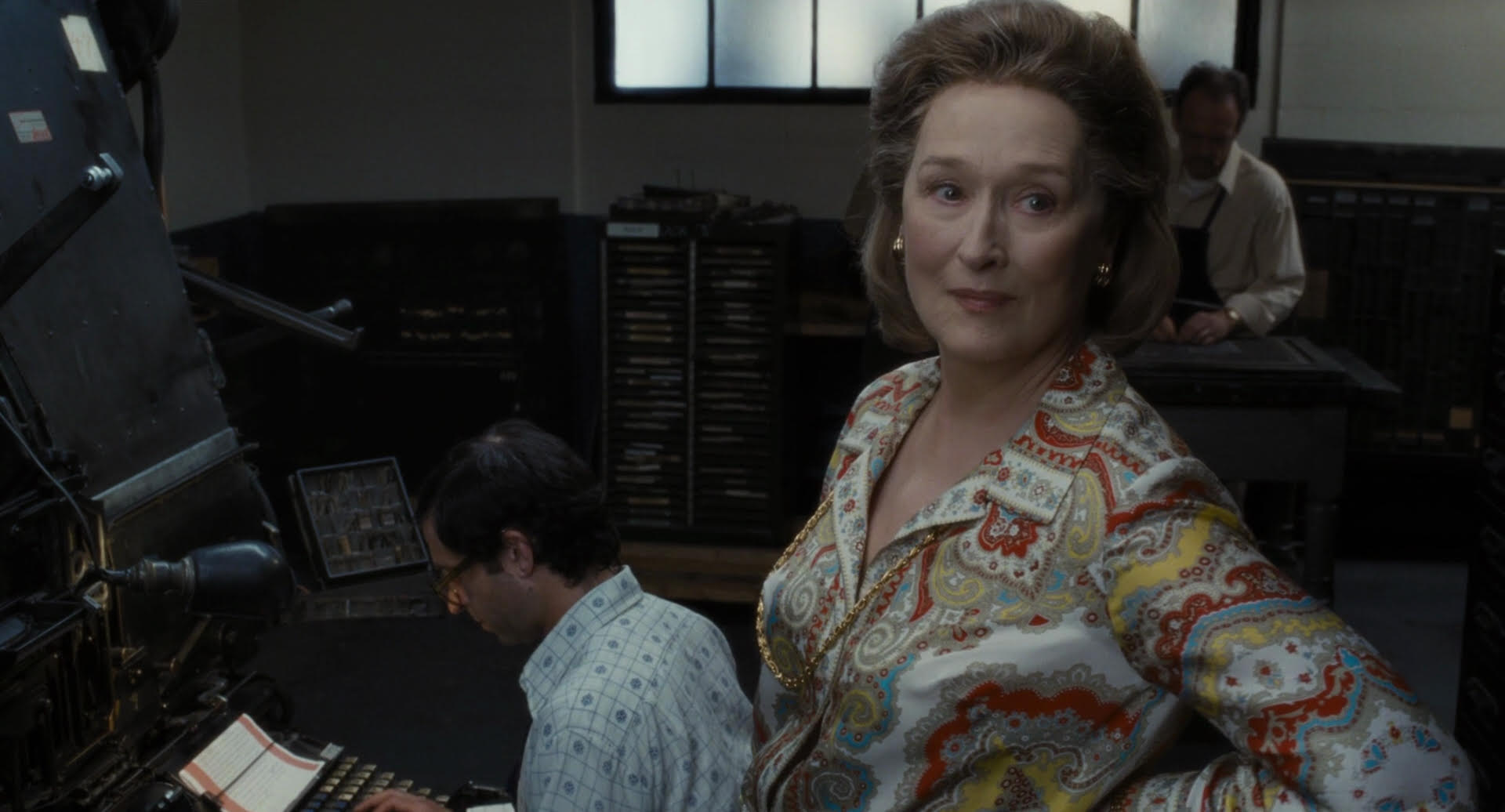
Streep’s entire performance could be classified as a series of impossible deliberations, and Spielberg treats her to many close-ups in which Streep enacts her signature talent for strategizing and thinking on screen. As Hanks’ Ben pressures her to publish, citing it as a vital act of journalistic integrity, Kay’s advisors, including her chairman Fritz Beebe (Tracy Letts) and board member Arthur Parsons (Bradley Whitford), urge a more cautious approach, citing Nixon’s bullish legal team and the delicacy of the Post’s stock market debut. Meanwhile, Bruce Greenwood’s McNamara tries his best to dissuade Kay from further embroiling him in scandal. Until she makes the final call, Streep’s decision remains unclear; her contemplative close-ups demonstrate the careful scrutiny and genuine difficulty of Kay’s quandary. When Kay ultimately decides to publish, even after multiple lawyers and counselors, and Bradlee himself, warns her that she could very well be arrested, Streep, the camera zooming in, plays out a host of feelings on her face, before exclaiming, “Let’s go, go, go, go, let’s do this, let’s publish.” Tremulous, her eyes watering, her back turned to the group of men behind her, Streep foregrounds Kay’s bravery and personal triumph in publishing, centering her choice as an immensely difficult yet ultimately heroic act, made all the more poignant by the fact of her being a woman in a singular position of authority. She is leading the charge for a free press and government oversight even as her reputation is tentative and her sound judgments are continually questioned.
What do you cherish most about Streep’s performance, which feels like a perfect conclusion to our series? Where does Kay Graham place in Streep’s constantly enriching career?
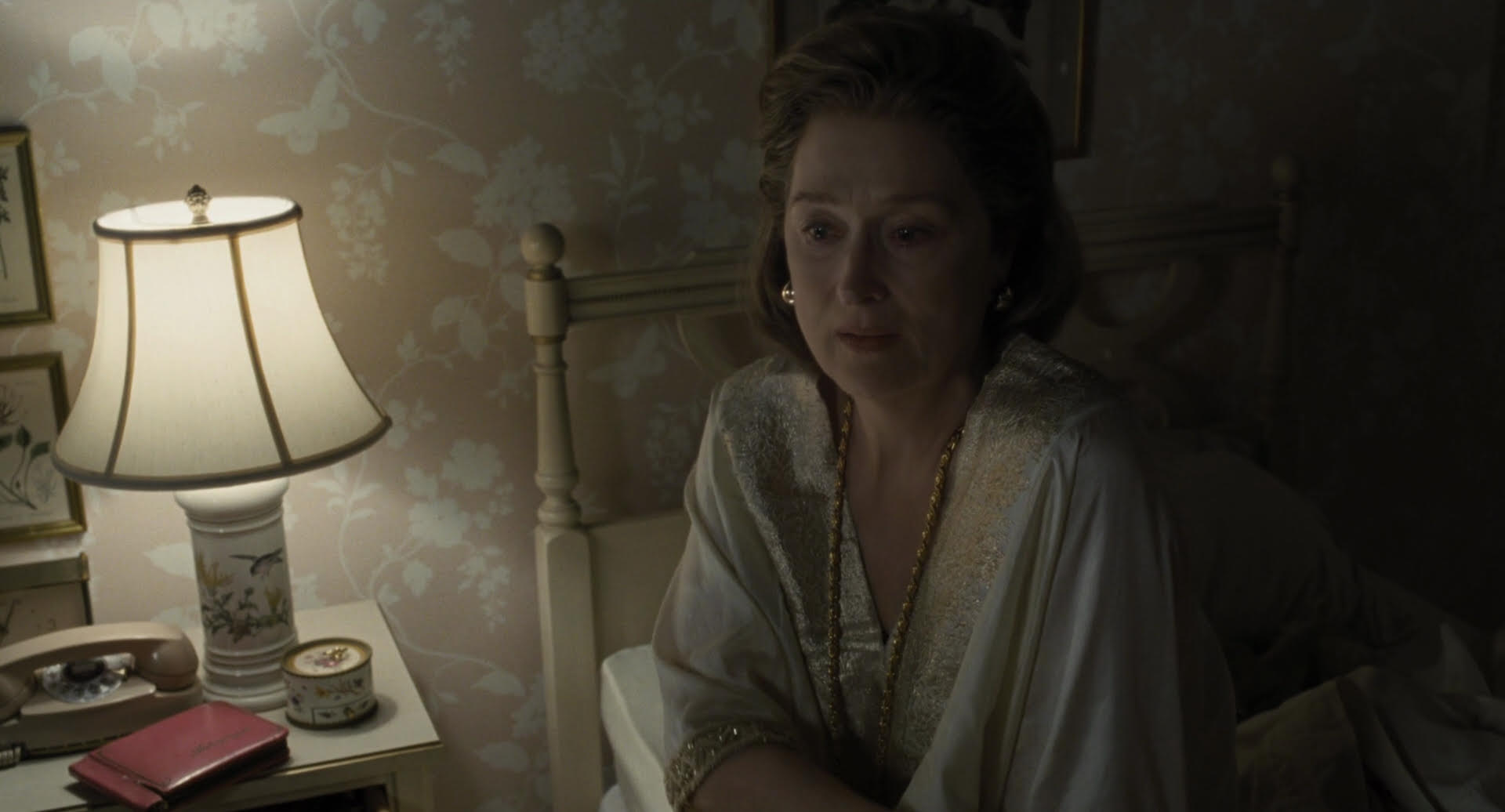
MATTHEW: In so many of her greatest performances, Streep gives her characters one of the most valuable gifts any actor can offer the person she inhabits: the courage to confront life. Streep does just this in The Post, transforming Kay from an appeasing doyenne of the D.C. circuit into a brave path-breaker who comes to see the value of a sharp pen and a free and honest press. Plenty of actors have played trailblazers on the big screen, but what sets Streep’s interpretation apart is the actress’ steadfast refusal to foreground Graham’s heroism or treat it as a foregone conclusion. Streep works outward from the idea that no one is born a leader and that heroism is never bestowed but earned and worked for; she is thus far less interested in valorizing each development in Kay’s journey than vivifying it with the utmost complexity.
What astonishes about Streep’s performance in The Post is her willingness to play Kay as a woman discovering her capacity for bravery, which also means playing Kay as a nervous wreck and a work-in-progress. Drawing heavily on Graham’s bestselling, Pulitzer-winning 1997 memoir, Personal History, Streep shows us all facets of the character — her lapses in judgment, her conflicts of interests, her failures of courage — while never losing sight of the societal constraints that have cornered Kay and rendered her insecure. What Streep places on screen, then, is a vivid display of what inequality looks and feels like. Streep not only makes this clear in the expected scenes, as when Kay is pitifully unable to rise to the occasion at a board meeting about taking the Post public, but threads it throughout what might be one of the most physically impeccable performances of her entire career. She worries and broods with consummate variety, but she also invests the performance with a host of behavioral traits that illuminate Kay’s crippling lack of confidence.
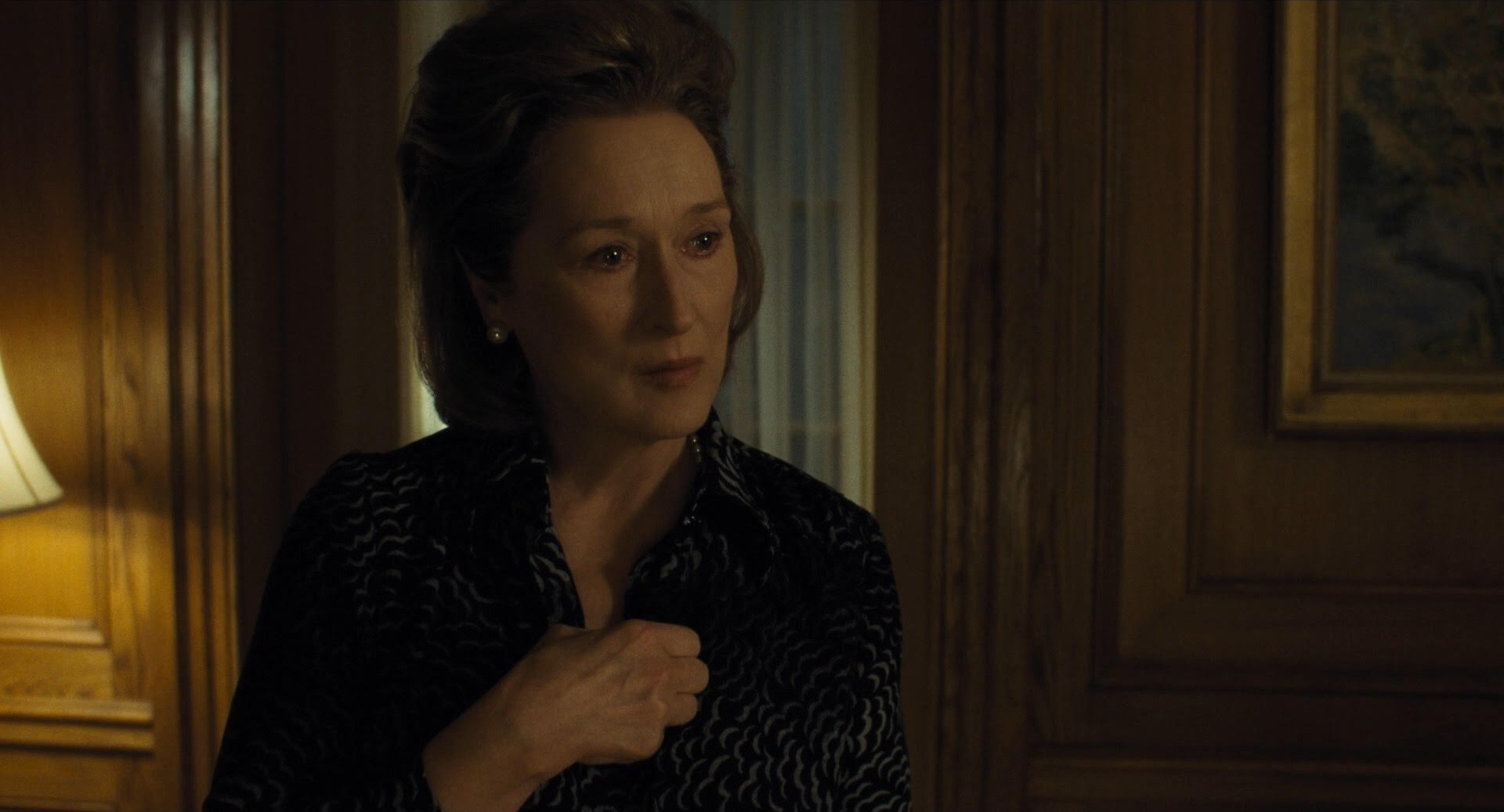
Spielberg is more interested in process than formula in The Post, and the same could be said of Streep, who benefits from his actor-friendly direction, in which bodies and faces fill the screen. We constantly see Kay clearing her throat, breathing heavily, and adjusting her posture and attire. As the pressure builds around Kay’s decision, Streep’s face noticeably blanches, her skin so often turning waxy with sweat. In one of her first few scenes, she even knocks over a chair as she scurries into a breakfast with Ben for which she is apologetically late; in this same scene, Streep shrinks with humiliation as Hanks’ conversation turns hectoring. When Kay stops by McNamara’s home to inform him of her dilemma, Streep uneasily holds tight to her car keys during the entire conversation.
Some might dismiss these as actorly tics, as so many of Streep’s performative choices have been labeled since The Deer Hunter’s Linda checked her appearance in a storefront mirror. Streep can be prone to overstatement, but in The Post she embodies Kay’s anxiety with more elegance than effort, carefully choosing and highlighting her gestures, imbuing them with feeling and using each one as an unclouded window into her character’s evolving and grieving state of mind. Certain filmmaking choices that might read as pandering are grounded by Streep’s humanizing tendencies: when Kay descends into a sea of admiring women on the steps of the Supreme Court (a shot Spielberg improvised on the day of shooting), Streep diminishes the shaky nostalgia of the moment by keeping Kay’s reaction polite but diffident; she’s a person still finding her footing in the realm of rebellion and unsure of any outright veneration. Streep locates such nuances throughout the performance. Kay may be a genuinely second-guessing personality, but Streep ensures that she is also capable of sly political maneuvering and well-placed caustic attacks; she pulls no punches when reminding Ben of his sycophantic relationship with the Kennedys and her every coded word to Whitford’s patronizing Arthur drips with displeasure — that is, until Kay must remind him who’s really boss in no uncertain terms.
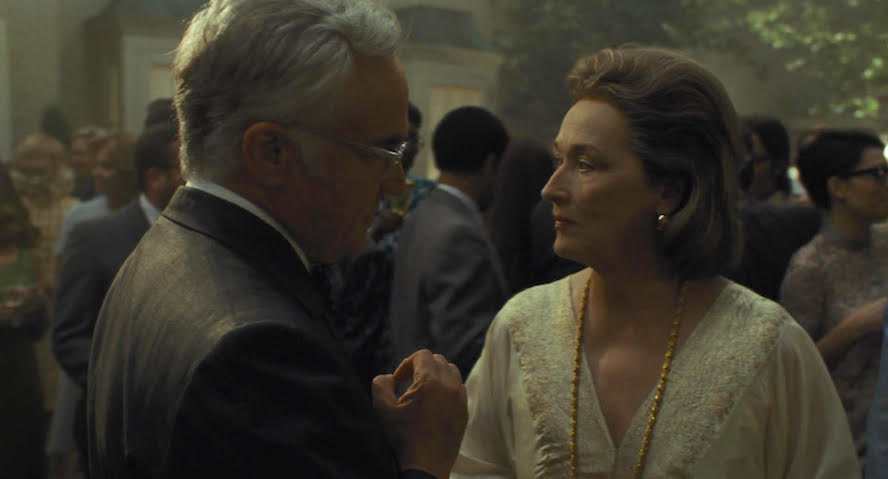
Kay’s consent to the publication of the papers marks a palpable shift in the character, a decisive turn in her stewardship of the Post and a test of both her mettle and conscience. “I suppose that, without quite realizing it, I was taking a veil,” Graham writes in Personal History about assuming her late spouse’s role, a sentiment that Streep makes manifest early in the film as Kay casts a loving and teary glance on a framed photo of her departed husband, the look of a woman who can hold her head high for the masses but has not quite recovered from this most unbearable of losses. When Kay gives the go-ahead, Streep plays the moment with all the magnitude it merits, a collision of personal ties and professional responsibility.
As Kay clutches the phone, deliberating over the decision that will change her life and her country forever, Streep is visibly overcome with emotion but also purpose. We have talked a lot about the choices that Streep’s characters have made: Sophie’s unspeakable sacrifice, Karen’s dogged crusade for workers’ rights, Francesca’s denial of a life outside Madison County, Susan’s reckless abandonment of comfort and self. The Post, a film in which people keep finding strength, insight, and inspiration from close yet unexpected sources and a story centered around the fateful decision of a single woman, feels like a fitting ending to this series but also a moving culmination of Streep’s entire career.
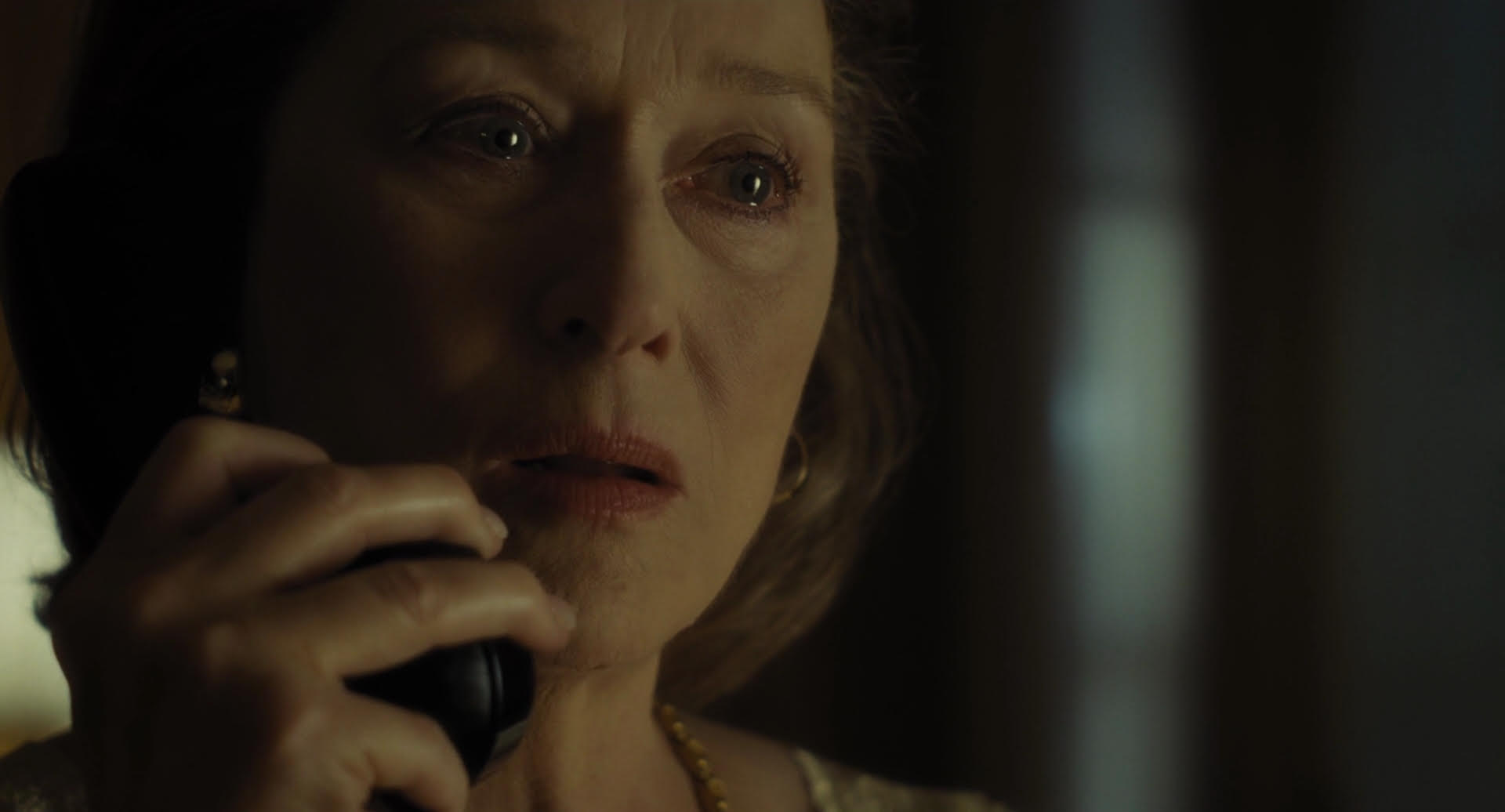
What is life without risk and heartache? What is the art of screen acting without Meryl Streep? At its core, acting is the process of making imagination into flesh. Few have done this with more grace, truth, and passion than Streep, whose technical mastery and chameleonic capabilities would mean next to nothing were it not for her preternatural ability to burrow into the souls of her characters and convey the gravity of the lives they lead. In Streep’s performances, the incomprehensibility and intangibility of human emotion are crystallized into points of reckoning, revelation, and choice. For four decades, Streep has captured and communicated what the most thrilling acting revolves around: the emotion of a moment. A child surrendered though never forgotten, a car door handle not opened, a phone call that moves a country forward. Such is the stuff of life; such is the art of Meryl Streep.

Every Episode of 'Months of Meryl'
- Julia (1977)
- The Deer Hunter (1978)
- Manhattan (1979)
- The Seduction of Joe Tynan (1979)
- Kramer vs Kramer (1979)
- The French Lieutenant's Woman (1981)
- Still of the Night (1982)
- Sophie's Choice (1982)
- Silkwood (1983)
- Falling in Love (1984)
- Plenty (1985)
- Out of Africa (1985)
- Heartburn (1986)
- Ironweed (1987)
- A Cry in the Dark (1988)
- She-Devil (1989)
- Postcards from the Edge (1990)
- Defending Your Life (1991)
- Death Becomes Her (1992)
- The House of the Spirits (1993)
- The River Wild (1994)
- The Bridges of Madison County (1995)
- Before and After (1996)
- Marvin's Room (1996)
- Dancing at Lughnasa (1998)
- One True Thing (1998)
- Music of the Heart (1999)
- Adaptation (2002)
- The Hours (2002)
- The Manchurian Candidate (2004)
- Lemony Snicket's A Series of Unfortunate Events (2004)
- Prime (2005)
- A Prairie Home Companion (2006)
- The Devil Wears Prada (2006)
- Dark Matter (2007)
- Evening (2007)
- Rendition (2007)
- Lions for Lambs (2007)
- Mamma Mia! (2008)
- Doubt (2008)
- Julie & Julia (2009)
- It's Complicated (2009)
- The Iron Lady (2011)
- Hope Springs (2012)
- August Osage County (2013)
- The Homesman (2014)
- The Giver (2014)
- Into the Woods (2014)
- Ricki and the Flash (2015)
- Suffragette (2015)
- Florence Foster Jenkins (2016)
- The Post (2017)



Reader Comments (26)
Thank you for this.
It is exactly why I thought Meryl should've won this year's Oscar.
And thank you for the whole series. It was always a must-read every Friday (Australian time) morning.
There's not a day I don't wish Streep won her third Oscar for this instead of Iron Lady. In terms of performance, politics, quality of film, caftans worn, and overall magnificence, it'd have been beautiful for her narrative to culminate in a win for The Post. You guys described her performance wonderfully, and this whole series has been a treat to follow all year long. Thank you very much for such quality discussions, and I look forward to what you'll both write in the new year!
I love this movie. I have seen it a couple of times and it really is great filmmaking from Spielberg. All the actors do a bang up job, and the writing is very good. For Streep it's a nice movie bookend (to date) between The Deer Hunter and the present.
Thank you so much for this series!!!
John and Matthew, thank you for your time, care, insight, and humor in putting together this series. You did a beautiful job, exulting why Streep is one of the best actors to ever step in front of a camera, but also holding her to some weaknesses and laziness, especially her strange evasion of great directors. You had so much smart critical thought poured into these articles, and it's wonderful to read pieces written by people who understand acting. Bravo across the board!
This series has been so amazing to follow. Thank you both for all the hard work and the wonderful writing.
Bravo. Now when can I buy the book version of this series? (Watched The Post again on a plane recently and goodness does it work.)
I agree with ALL. Above comments❤️❤️❤️
Yes and yes. Wonderful movie that rises and falls by Streep's even more wonderful performance. She's well paired with Hanks, but Kay is really the heart and soul of the story, and her evolution what makes it work so well.
CAFTAN MAGIC
A victory of character development.
This was/is a fabulous film with tremendous performances. My choice for Best Picture, in fact. It should have been up for many Oscars, instead of just barely limping in with a measly 2 nominations. At least they were for major categories. Meryl was the best in a very strong field - they all deserved to win, really. Streep, Hanks, Spielberg. Are they being taken for granted because they're just too good too much of the time?
A wonderful entry in the series for one of the best Meryl Streep performances. Well done.
My winner,perfect Write up,she'smagic where Hanks is miscast..
thank you for this series !!
Absolutely loved this series in 2018. Let me know when I can buy the book version. Thank you both so much for this wonderful last entry.
But does it have to be the last???
None's perfect, thankfully so, but she'll remain my favorite forever. Bless her!
I'm glad she finally was able to work with Spielberg. I'm pretty sure she wanted ever since, but there wasn't a role for her until The Post. People often forget the good LEAD roles for women Meryl's age are rare, even for her.
Streep sometimes gets nominated for unworthy performances (for example, Into The Woods & August: Osage County) but she was really, really good in The Post and def deserved the nod for work. This piece makes a solid case for it. Thank you.
Thank you such a beautifully written and enlightening series. Its certainly encouraged me to seek out titles of hers I have yet to watch. Doesn't feel like that long ago that we were all reading about her debut in Julia.
Thank you for this series. As a big Meryl Streep fan ever since I was a kid, this fills my heart with joy.
I have been so busy with the holidays, sorry I am late to this. I want to thank both John and Matthew for this series, and also thanks to Nathaniel for his blog which allows us all to read and participate in this retrospective. This whole series has been a wonderful gift which lasted a whole year.
The Post, was a timely and fitting way to put the cherry on top of this series. Great role, and Meryl brought out the truth and small moments to give us insight into Kay Graham.
Meryl Streep will go on, she has an artistry that will not be denied, and fortunately she is bankable at an age that defies Hollywood misogynistic attitudes. I will always be there to see what she does.
It has been a pleasure to check in with so many other fans who clearly feel the same way.
I think I like her a little less after this series. I wasn't aware of all the junk she has made over the years.
I, too, really appreciate this series. She is the only American woman of her generation who continues to be a viable movie star decade after decade after decade. (And this series hasn't covered her private life, but she's such an admirable human being, too.)
And like Juan Carlos, I've been a Streep fan as a kid, so I was tickled to see her play Katharine Graham, one of my role models, so well. I need to revisit the film again soon!
Can the authors each list their top ten best Streep films for a future column?! I need more! Versatile and great artist.
One of her best performances. Another great write-up. Thank you so much for the series!
Thanks for this excellent series! I've thoroughly enjoyed your sharp and deep look at her film work. And thanks for not pulling any punches.
Dare we hope for occasional bonus entries in 2019 - Mary Poppins Returns, Angels in America, Holocaust, The Music of Regret, The Simpsons?